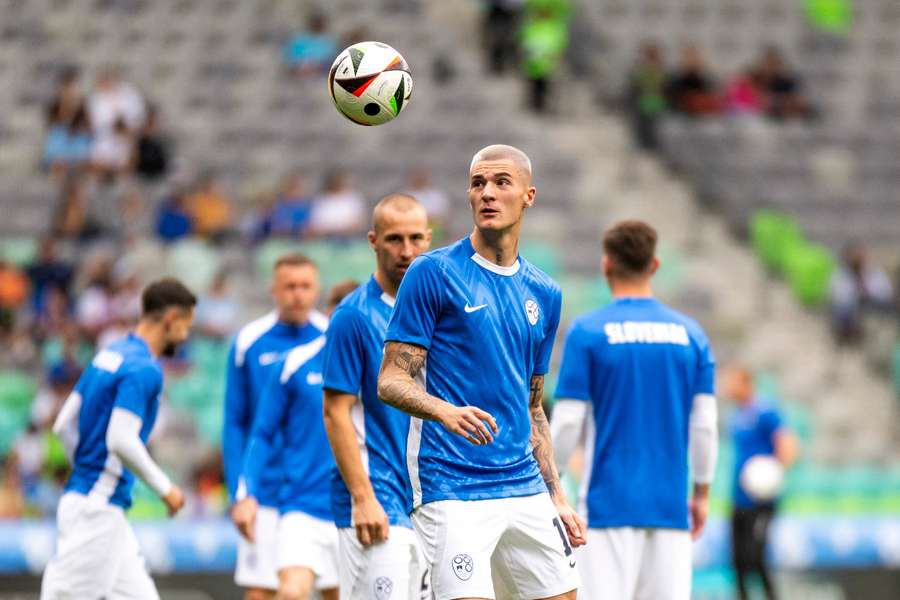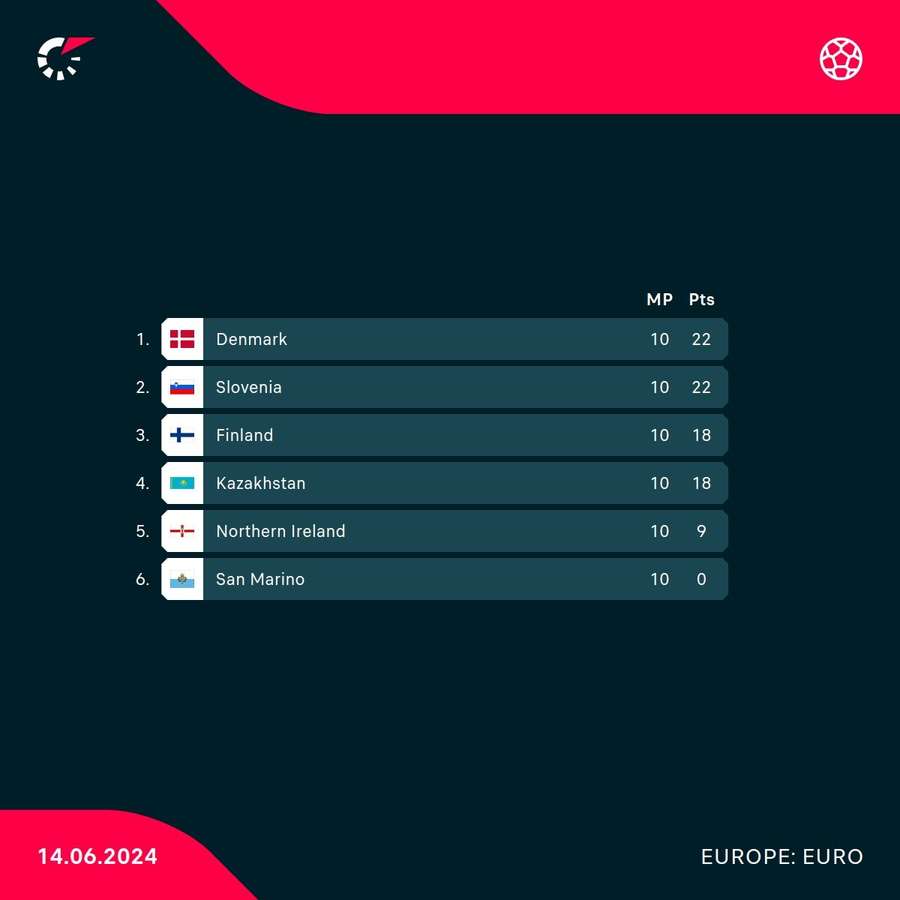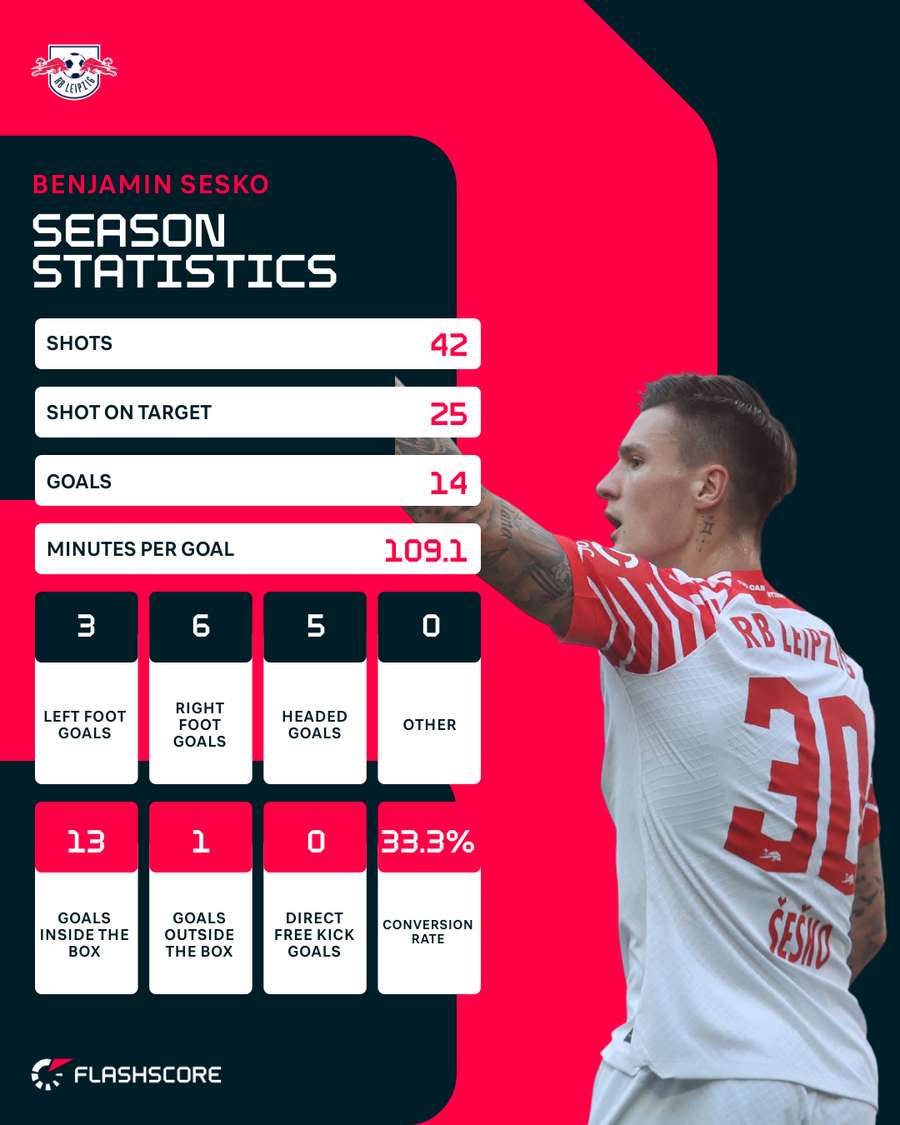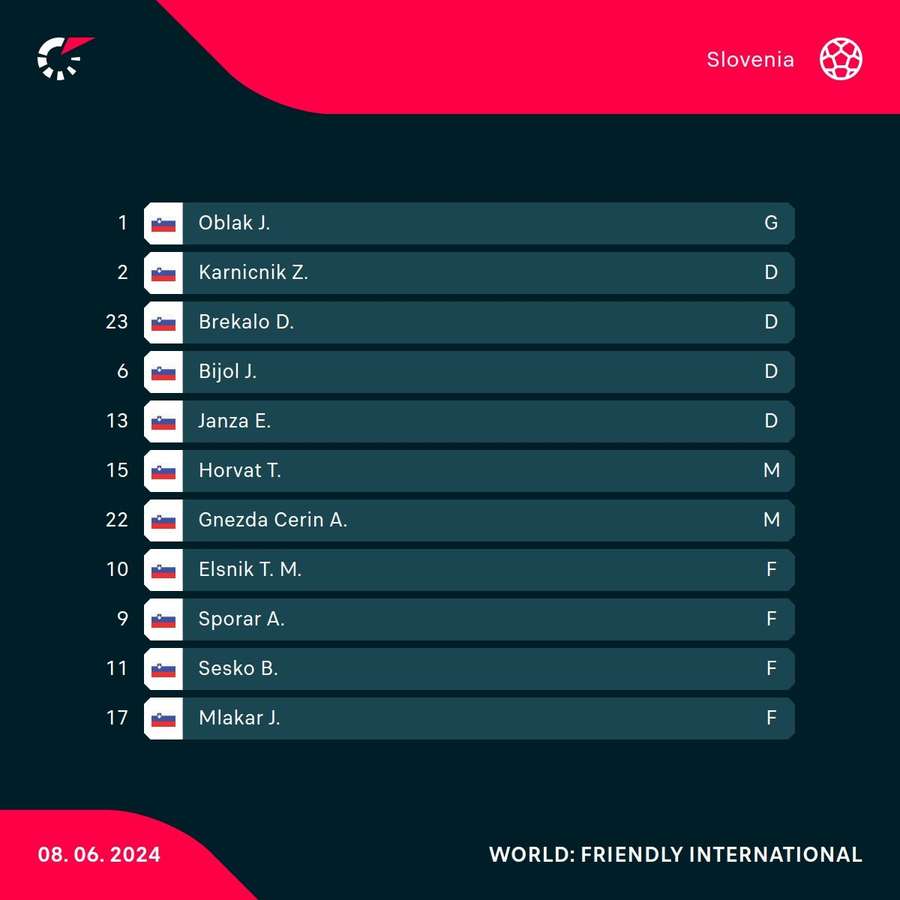EURO 2024 Preview: Sesko and Cerin give Slovenia a chance of long-awaited success

Slovenia can be summed up nicely by their debut match in a major tournament, at Euro 2000. They incredibly took a 3-0 lead over a star-studded Yugoslavia, the nation they'd recently gained independence from, in what looked like a fitting emancipation of a now separate state that itself used to be an insignificant part of the Yugoslav side. What happened next, with Yugoslavia fighting back to draw 3-3 and Slovenia going out in the group stage, was an apt expression of the brief nature of Slovenian success in the years to come.
This was true for Valter Birsa, the scorer of a magnificent goal at the 2010 World Cup and Slovenian Footballer of the Year that year who soon afterwards was just a bit of a punchline in Italy at the theoretical peak of his powers, and for Kevin Kampl, who won the same award twice in a row at a similar age, only to subsequently burn out at Borussia Dortmund. Both said goodbye to the national team in 2018 shortly after a late own goal against Slovakia had all but deprived them of another opportunity to represent their nation on the biggest stage.
Can Slovenia this year finally find some sustained success and trump neighbours Croatia, a Balkan country that has managed so with a small - although still almost double that of Slovenia's - population?
The Road to Germany

This was in a way a historic qualifying campaign, with the side securing their first automatic qualification ever.
Up to this point, Slovenia had only made it to major tournaments via playoffs, and they changed that largely thanks to a relatively easy group with no outright favourite. Denmark, as expected, finished first, and while the main task of finishing ahead of Finland wasn't accomplished easily thanks to a 2-0 loss in Helsinki, the home rematch - a 3-0 win - made up for that.
At face value, it may look like Slovenia's progression to the Euros was mainly due to Finland's home loss to Kazakhstan, but their own home draw with Denmark was more decisive, and while the Slovenians did only create a total of two scoring chances in their two games against the group favourites, the point is that only the games between the top two denied them top spot.
The Slovenians didn't dominate the group by any stretch of the imagination, but they picked up points at a steady pace, although they did average four fewer touches of the ball per game than the Czech Republic and were on par with Iceland and Ireland.
Coach: Matjaz Kek
In Slovenia, they have effectively experienced two types of personalities in coaching or director positions.
On the one side stand Zlatko Zahovic and Branko Oblak, perhaps the best Slovenian footballer in history and the coach of the national team from 2004 to 2006, who spent one half of their careers berating everything and everyone around them, and the other half apologising. On the other side are the calmer communicators Srecko Katanec and Matjaz Kek. For the current national team coach, handling questions from journalists is generally often cited as his main strength, which is probably equal parts good and bad news.
Not that Kek is a bad coach. It wouldn't be fair to say that there is no difference between his Slovenia side of 2010 and of 2023, and that he himself hasn't seen any personal or professional development.
Between those spells, he had a long spell in the Croatian league at the helm of HNK Rijeka, who until his arrival were sitting in the shadow of their arch-rivals from the capital, waiting for their first-ever title. That came in the 2016/17 season, combined with the cup, with the side outlasting the hated Dinamo Zagreb in a heroic battle on both fronts. Probably no one in modern history has caused such a whirlwind in Croatian football as Matjaz Kek.
But at the same time, it must be said that Kek's Slovenia do have the potential to be one of the least impressive performers at this year's Euros. During his first stint in charge of the national team (2007 to 11), Kek earned the nickname 'Kekec', which is simultaneously a slang term for 'naive fool' and the popular hero of the Slovenian film of the same name, a reference to a cunning boy who uses the timely release of an owl to scare off a poacher. In his second engagement, Kek regularly takes on both forms.
There have been strong opponents that he manages to outperform, a recent 2-0 win over Portugal for instance, while weak performances often come against the weakest opponents like Malta, who he could only draw 2-2 with. Now he's on a mission to show everyone that the first face is the dominant one.
The team's driving force: Benjamin Sesko

At 21 years old, Benjamin Sesko would easily qualify for the next section, but only by age.
He has multi-dimensional quality, standing at 195cm but with excellent speed and technique; he has consistency, scoring in 10 of his 17 Bundesliga starts this season; and he has the demeanour and mentality of an older, more experienced man.
The Slovenians are convinced they are watching the development of a future superstar. Sesko's stature and career trajectory (from Salzburg to the Bundesliga) are strikingly reminiscent of a certain blonde Manchester phenomenon, and it is true that similarities can be found in the playing profiles. And just like Erling Haaland, Sesko is in no hurry to go anywhere just yet and plans to make a proper breakthrough in Germany first, which is why he signed a new improved contract until 2028.
Although his height predestined him to continue the tradition of his father's craft as a goalkeeper, and his mother's nationality to represent Bosnia and Herzegovina, Sesko eventually grew into a fantastic striker for Slovenia and RB Leipzig, where fans enjoy him in a slightly different position, with him often moving into the right-wing areas for his club whereas for the national team he stays in the middle.
If he scores at the Euros with his right foot (six times in the Bundesliga), his left (three times) and his head (five times), don't be surprised. He'll be at home in Germany and there aren't many more complete strikers around the world.
On the cusp of glory: Adam Cerin
It's no mean feat to force your way into Panathinaikos' highly experienced and balanced midfield, and yet Adam Cerin has done it.
He may not score many, but his left foot can work magic (he created 13 chances with it in qualifying) and his profile is so comprehensive that his contribution will always be felt at both ends of the pitch.
According to the Opta database, Cerin created the most chances for Slovenia in qualifying (23, 11 more than anyone else). That's an incredible dependency, and they know it well in Athens, where Cerin plays with compatriot Andraz Sporar.
He narrowly missed out on working with coach Kek in Rijeka (he was there from 2020 to 22), but won his trust with the national team, not missing a minute in qualifying. As a product of Domzale's renowned academy, he has a solid technical foundation, complemented by superior intelligence that allows him to operate reliably in the central pairing in Kek's 4-4-2.
Likely lineup and tactics

In a way, this Slovenia side is a continuation of the fading tradition of the rigid 4-4-2 formation, whose flag on the European and even world stage was so long held by Sweden and hardly anyone else, but the Slovenians deviate quite significantly from the Scandinavian concept.
They have a world-class player in goal, which the Swedes have always lacked; in Adam Cerin, they have a top box-to-box playmaker, which the Swedes have never been able to produce much of, relying more on a cautious midfield two; and their main offensive star, Sesko, certainly doesn't play on the wing like Emil Forsberg, but scores and creates through the middle.
Between the goalposts will probably be the absolute alpha and omega of Slovenia's potential success at this tournament. Jan Oblak's name may no longer have the same international lustre as it did when he nullified Barcelona and Bayern Munich en route to the Champions League final or equalled the 22-year-old record for fewest goals conceded in La Liga (2015/16), but he undoubtedly remains one of the best. He leads Slovenia as captain and, according to the Wyscout database, in qualifying only his Romanian counterpart kept out more expected goals (4.12xG).
Oblak can also rely on the centre-back duo in front of him. At 25, Udinese's Jaka Bijol has been attracting interest from clubs like Inter and Roma for some time now, and he looks a natural successor to Bostjan Cesar, currently the right-hand man to the head coach. Bijol had been out since December but managed to return just in time to play in the March matches.
His role at Udinese is quite different - he usually plays in the middle of a back three - which may lead to the uncovering of considerable pace limitations at the Euros. His partner will probably be Miha Blazic, whose ceiling roughly matches that of Lech Poznan at 31, but David Brekalo is pushing him.
As we get to the edges of the defence, we encounter our first significant problem, which is not so much the starting players but the depth.
On the left, Erik Janza - another thirty-year-old from the Polish league (Gornik) - is backed up by Jure Balkovec, who is a bit like Ricardo Rodriguez of recent years in that only his set-piece ability remains from his prime, which he spent mostly in Italy.
On the right, it's even worse. The only natural backup for Zan Karnicnik is first-choice winger Petar Stojanovic, retrained for national team purposes. In fact, he will play at full-back in certain phases of the game, when he stays back and pushes Karnicnik to the third centre-back position, thus forming an extremely important dynamic. If Slovenia lose that, they'll be in trouble. Karnicnik is generally the joker of this selection; in great form and able to cover on the left as well.
The battle for the left-wing spot is likely to be the biggest. Jan Mlakar may have started both friendlies before the Euros and scored in both, but he is also a strange right-footed option who only scored in qualifying against San Marino.
The former teen sensation - who was expected to cost Fiorentina a million euros at the age of 16 - has to fend off strong and naturally more talented competition in the form of another unfulfilled hope, Sandi Lovric, and Benjamin Verbic, who looked fearless in 2018 but one unfortunate move to Ukraine (terminated early due to the war and personal problems) and two blown seasons in Athens later, his outlook is now considerably worse. However, he still has the talent, and was the one who brought down Kazakhstan with the winning goal.
In the midfield, somewhat surprisingly, there is no room for Miha Zayc, whose exclusion from the squad creates a lack of playmaking ability. Not that it's a surprise, but if your only plan B - if not C - is 36-year-old Josip Ilicic, you're not in an entirely optimal situation. Ilicic had an excellent second half of the season, but only at Maribor, and the 4-4-2 formation offers almost no use for him other than perhaps in attack.
However, if we accept the absence of spectacular long-range passes and other niceties, the central pairing isn't bad. On the contrary, Cerin and Timi Elsnik are in fact the team's key players, and in case one of them drops out, the tall and strong midfielder Adrian Zeljkovic, who has been looking on the verge of a transfer for quite some time, is always ready to jump in.
And finally the attack, the strongest area of this version of the Slovenian national team. Sesko contributed five goals and yet was not the hero of qualifying - that title belongs more to teammate Sporar. He scored a crucial goal against Denmark and helped break a resilient Northern Ireland side with two, and his excellent pressing led to Finland being effectively beaten inside the opening half-hour in a crucial 3-0 win. Since his 29-goal breakthrough season at Slovan Bratislava, he has moved into calmer waters of around 10 goals, but his killer instinct hasn't gone anywhere.
And if by chance it suddenly does, there's always Zan Celar on hand - the most consistent scorer in the Swiss league over the last three years, with the motivation to earn a move to a top competition. Also from the bench, Zan Vipotnik is ready to jump in.



